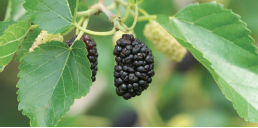A within-subjects research design was conducted at an out-patient clinic in Thailand to evaluate the hypolipidemic effects of mulberry leaf in non-diabetic patients with mild dyslipidemia.. Twenty-three patients who met the National Cholesterol Education Program Adult Treatment Panel III criteria guideline for dyslipidemia and failed a four-week diet therapy were enrolled. Subjects were assigned to receive three tablets of 280 mg mulberry leaf per tablet three times daily before meals for 12 weeks and blood analyses were performed every four weeks. At four and eight weeks of mulberry leaf tablet therapy, triglycerides (TG) had significantly decreased by 10.2% (p < 0.05) and 12.5% (p < 0.05), respectively, from baseline. At the end of the study, total cholesterol, TG, and low-density lipoprotein cholesterol had decreased by 4.9% (p < 0.05), 14.1% (p < 0.05), and 5.6% (p < 0.05), respectively, from baseline, whereas high-density lipoprotein (HDL) cholesterol had increased by 19.7% (p < 0.05). Although some patients experienced such side effects as mild diarrhea (26%), dizziness (8.7%), or constipation and bloating (4.3%), mulberry leaf tablet therapy is considered safe and effective in decreasing cholesterol and increasing HDL levels in patients with mild dyslipidemia. Phytother Res. 2011 Mar;25(3):365-9. PMID: 20687135









